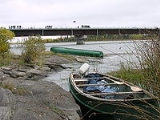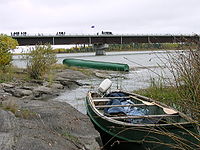
Cross Lake First Nation
Encyclopedia
Cross Lake First Nation is a band of Cree
First Nations people in Canada
governed under the Indian Act
. Its members occupy several reserves
within the town of Cross Lake
situated on the east shore of Cross Lake
in the province of Manitoba
. In October, 2008, its recorded registered
membership was 6,969, of which 4,953 people of this First Nation lived on their reserve. Cross Lake is the principal community of the Pimicikamak
indigenous people that made treaty
with the British Crown
in 1875. Its indigenous language is Woods Cree
. Cross Lake was the site of a residential school operated under Canada's assimilation policy. In 2008, Prime Minister Stephen Harper
apologized for the damage caused by this policy.
, Cross Lake First Nation has a municipal government with a Band Council. Since 1999, the Band Council is no longer elected under the Indian Act
. The Executive Council of Pimicikamak
sits ex officio as the Council of the Band but continues to be the agent of the Minister of Indian Affairs for delivering programs to band members on reserve
.
Chief
Council
holdings. Their largest reserve is the 2037.1 hectares (5,033.8 acre) Cross Lake 19 Reserve. Associated with this reserve are:
is the principal community for the Cross Lake First Nation. Other major communities for the First Nation are:
on reserve.
is the only community in north-eastern Manitoba that is connected to the North American highway system by all-weather road via the C$24 M Kichi Sipi Bridge
, which the Province of Manitoba built after losing a lawsuit

Cree
The Cree are one of the largest groups of First Nations / Native Americans in North America, with 200,000 members living in Canada. In Canada, the major proportion of Cree live north and west of Lake Superior, in Ontario, Manitoba, Saskatchewan, Alberta and the Northwest Territories, although...
First Nations people in Canada
Canada
Canada is a North American country consisting of ten provinces and three territories. Located in the northern part of the continent, it extends from the Atlantic Ocean in the east to the Pacific Ocean in the west, and northward into the Arctic Ocean...
governed under the Indian Act
Indian Act
The Indian Act , R.S., 1951, c. I-5, is a Canadian statute that concerns registered Indians, their bands, and the system of Indian reserves...
. Its members occupy several reserves
Indian reserve
In Canada, an Indian reserve is specified by the Indian Act as a "tract of land, the legal title to which is vested in Her Majesty, that has been set apart by Her Majesty for the use and benefit of a band." The Act also specifies that land reserved for the use and benefit of a band which is not...
within the town of Cross Lake
Cross Lake, Manitoba
Cross Lake is the name of two closely related, adjoining but independent communities in the Canadian Province of Manitoba. One of the Cross Lakes is the Cross Lake Indian Reserve where the main urban area is called Cross Lake...
situated on the east shore of Cross Lake
Cross Lake (Manitoba)
Cross Lake is a lake in Manitoba on the Nelson River north of Lake Winnipeg. It is long and narrow and extends at least 40 miles east-northeast. The Nelson enters and leaves on the west side. The Minago River enters on the west. From the Minago a portage led to Moose Lake and the Saskatchewan...
in the province of Manitoba
Manitoba
Manitoba is a Canadian prairie province with an area of . The province has over 110,000 lakes and has a largely continental climate because of its flat topography. Agriculture, mostly concentrated in the fertile southern and western parts of the province, is vital to the province's economy; other...
. In October, 2008, its recorded registered
Indian Register
The Indian Register is the official record of Status Indians or Registered Indians in Canada. Status Indians have rights and benefits that are not granted to unregistered Indians, Inuit, or Métis, the chief benefits of which include the granting of reserves and of rights associated with them, an...
membership was 6,969, of which 4,953 people of this First Nation lived on their reserve. Cross Lake is the principal community of the Pimicikamak
Pimicikamak
Pimicikamak is the name of one of the Cree-speaking aboriginal peoples of Canada. Pimicikamak is "a people of rivers and lakes. The traditional territory of Pimicikamak is around Sipiwesk Lake in the heart of the boreal forest, five hundred kilometres north of Winnipeg, Manitoba...
indigenous people that made treaty
Treaty 5
Treaty 5 is a treaty that was first established in September, 1875, between Queen Victoria and Saulteaux and Swampy Cree non-treaty tribes and peoples around Lake Winnipeg in the District of Keewatin. Much of what is today central and northern Manitoba was covered by the treaty, as were a few small...
with the British Crown
The Crown
The Crown is a corporation sole that in the Commonwealth realms and any provincial or state sub-divisions thereof represents the legal embodiment of governance, whether executive, legislative, or judicial...
in 1875. Its indigenous language is Woods Cree
Woods Cree language
Woods Cree is an Algonquian language spoken in Manitoba and Saskatchewan, Canada.It only has 14 letters in the alphabet. There are marked and unmarked letters...
. Cross Lake was the site of a residential school operated under Canada's assimilation policy. In 2008, Prime Minister Stephen Harper
Stephen Harper
Stephen Joseph Harper is the 22nd and current Prime Minister of Canada and leader of the Conservative Party. Harper became prime minister when his party formed a minority government after the 2006 federal election...
apologized for the damage caused by this policy.
Governance
Under the Indian ActIndian Act
The Indian Act , R.S., 1951, c. I-5, is a Canadian statute that concerns registered Indians, their bands, and the system of Indian reserves...
, Cross Lake First Nation has a municipal government with a Band Council. Since 1999, the Band Council is no longer elected under the Indian Act
Indian Act
The Indian Act , R.S., 1951, c. I-5, is a Canadian statute that concerns registered Indians, their bands, and the system of Indian reserves...
. The Executive Council of Pimicikamak
Pimicikamak
Pimicikamak is the name of one of the Cree-speaking aboriginal peoples of Canada. Pimicikamak is "a people of rivers and lakes. The traditional territory of Pimicikamak is around Sipiwesk Lake in the heart of the boreal forest, five hundred kilometres north of Winnipeg, Manitoba...
sits ex officio as the Council of the Band but continues to be the agent of the Minister of Indian Affairs for delivering programs to band members on reserve
Indian reserve
In Canada, an Indian reserve is specified by the Indian Act as a "tract of land, the legal title to which is vested in Her Majesty, that has been set apart by Her Majesty for the use and benefit of a band." The Act also specifies that land reserved for the use and benefit of a band which is not...
.
Chief and Council
Current Chief and Councillors were appointed on September 14, 2009, under the Custom Electoral System. In their council, quorum of 5 members is needed.Chief
- Chief Garrison W. Settee
- Principle Spokesperson of the Nation
- Primary Intergovernmental Affairs
- Government Relations
- International Relations
Council
- Councillor Garrison Settee
- Northern Flood Agreement
- All Northern Flood Agreement Claims/Matters
- Reserve Lands
- Natural Resources
- Northern Flood Agreement
- Member of the Financial Management Board
- Executive Council Relations
- Councillor Allan J. Ross
- Justice Restoration
- Justice
- Band Constables
- RCMP
- Courts
- Corrections
- Gaming
- Elders Council Liaison
- Councillor Zacheus Trout
- Housing
- Eduacation
- Culture & Heritage
- Cree Language
- Councillor Donnie Mckay
- Health
- Economic Development
- Public Works
- Highways & Transportation
- Midnorth Development Corporation
- Ponton
- Arena Trust
- Councillor Allan J. Ross
- Member of the Financial Management Board
- Councillor Ronnie Beardy
- Communications
- MCTV
- CFNC
- Cell Phone/Internet
- Taxation
- Recreation
- Youth Council Liaison
- Men's Wellness
- Communications
- Councillor Shirley Robinson
- Finance
- Band Administration
- Pathways
- Employmnet & Training
- Mining
- Councillor Ronnie Beardy
- Chair of the Financial Management Board
- Councillor Eugennie Mercredi
- Aboriginal Headstart Program
- Day Care
- Muchipuniwin Program
- PCN Campaign
- Women's Council Liaison
- Councillor Grace Ross
- Welfare
- Old Folks Home
- Awasis Agency (Cross Lake)
- Membership/Citizenship
- PCN Laws Amendments
- New Proposed PCN Laws
- Councillor Eugennie Mercredi
Reserves
Cross Lake First Nation have reserved for themselves several tracts of land as their reserveIndian reserve
In Canada, an Indian reserve is specified by the Indian Act as a "tract of land, the legal title to which is vested in Her Majesty, that has been set apart by Her Majesty for the use and benefit of a band." The Act also specifies that land reserved for the use and benefit of a band which is not...
holdings. Their largest reserve is the 2037.1 hectares (5,033.8 acre) Cross Lake 19 Reserve. Associated with this reserve are:
- Cross Lake 19A Reserve
- Cross Lake 19B Reserve
- Cross Lake 19C Reserve
- Cross Lake 19D Reserve
- Cross Lake 19E Reserve
- Cross Lake 19X01 Reserve
- Cross Lake 19X02 Reserve
- Cross Lake 19X03 Reserve
- Cross Lake 19X05 Reserve
- Cross Lake 19X06 Reserve
- Whiskeyjack Reserve
Community
Cross Lake, ManitobaCross Lake, Manitoba
Cross Lake is the name of two closely related, adjoining but independent communities in the Canadian Province of Manitoba. One of the Cross Lakes is the Cross Lake Indian Reserve where the main urban area is called Cross Lake...
is the principal community for the Cross Lake First Nation. Other major communities for the First Nation are:
- Pikwitonei, ManitobaPikwitonei, ManitobaPikwitonei, Manitoba is a community in Manitoba. The community is served by VIA Rail at the Pikwitonei railway station....
- Thicket Portage, ManitobaThicket Portage, ManitobaThicket Portage is a community in northern Manitoba located on the Hudson Bay Railway. The community receives passenger rail service at the Thicket Portage railway station. The community has no all-weather road access. The community is serviced by year round train access, local airport, and winter...
- Wabowden, ManitobaWabowden, ManitobaWabowden is a community in northern Manitoba. It is situated on Provincial Trunk Highway #6, which is the main route between Thompson and the provincial capital, Winnipeg....
Child protection
Cross Lake was the site of a residential school operated under Canada's aboriginal assimilation policy. In 2008, Prime Minister Stephen Harper apologized for the "profoundly negative" consequences of this policy. Cross Lake First Nation is a member of Awasis Agency for aboriginal child protectionAboriginal child protection
Aboriginal child protection describes services designed specifically for protection of the children of "aboriginal" or indigenous peoples, particularly where these peoples are a minority within a country. They may differ at international, national, legal, cultural, social, professional and program...
on reserve.
Highway connection
Cross LakeCross Lake
Cross Lake lies on the border of Cayuga and Onondaga Counties in New York. Cross Lake lies within the boundaries of the traditional Onondaga Indian Nation. The lake is reputed in local tradition to be the boyhood home of Hiawatha, the great peace maker...
is the only community in north-eastern Manitoba that is connected to the North American highway system by all-weather road via the C$24 M Kichi Sipi Bridge
Kichi Sipi Bridge
The Kichi Sipi Bridge spans a deep channel of the Nelson River south of Cross Lake, providing the only all-weather road link between eastern Manitoba and the rest of Canada and North America. Its origins are unusual and its technology innovative...
, which the Province of Manitoba built after losing a lawsuit


